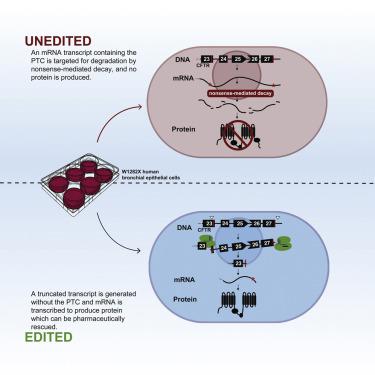Molecular Therapy - Methods & Clinical Development ( IF 4.6 ) Pub Date : 2020-05-12 , DOI: 10.1016/j.omtm.2020.05.002 Steven Erwood 1, 2 , Onofrio Laselva 3, 4 , Teija M I Bily 1 , Reid A Brewer 1 , Alexandra H Rutherford 1 , Christine E Bear 3, 4, 5 , Evgueni A Ivakine 1, 4

|
Nonsense-mediated decay (NMD) is a major pathogenic mechanism underlying a diversity of genetic disorders. Nonsense variants tend to lead to more severe disease phenotypes and are often difficult targets for small molecule therapeutic development as a result of insufficient protein production. The treatment of cystic fibrosis (CF), an autosomal recessive disease caused by mutations in the CFTR gene, exemplifies the challenge of therapeutically addressing nonsense mutations in human disease. Therapeutic development in CF has led to multiple, highly successful protein modulatory interventions, yet no targeted therapies have been approved for nonsense mutations. Here, we have designed a CRISPR-Cas9-based strategy for the targeted prevention of NMD of CFTR transcripts containing the second most common nonsense variant listed in CFTR2, W1282X. By introducing a deletion of the downstream genic region following the premature stop codon, we demonstrate significantly increased protein expression of this mutant variant. Notably, in combination with protein modulators, genome editing significantly increases the potentiated channel activity of W1282X-CFTR in human bronchial epithelial cells. Furthermore, we show how the outlined approach can be modified to permit allele-specific editing. The described approach can be extended to other late-occurring nonsense mutations in the CFTR gene or applied as a generalized approach for gene-specific prevention of NMD in disorders where a truncated protein product retains full or partial functionality.
中文翻译:

使用同源独立基因组编辑对囊性纤维化中无义介导的衰退进行等位基因特异性预防。
无义介导的衰变(NMD)是多种遗传性疾病的主要致病机制。无义变异往往会导致更严重的疾病表型,并且由于蛋白质生产不足,常常成为小分子治疗开发的困难目标。囊性纤维化 (CF) 是一种由CFTR基因突变引起的常染色体隐性遗传疾病,其治疗例证了治疗人类疾病中无义突变所面临的挑战。 CF 治疗的发展带来了多种非常成功的蛋白质调节干预措施,但尚未批准针对无义突变的靶向疗法。在这里,我们设计了一种基于 CRISPR-Cas9 的策略,用于靶向预防包含 CFTR2 中列出的第二个最常见无义变体 W1282X 的CFTR转录本的 NMD。通过在过早终止密码子之后引入下游基因区域的缺失,我们证明了该突变变体的蛋白质表达显着增加。值得注意的是,与蛋白质调节剂相结合,基因组编辑显着增加了人支气管上皮细胞中 W1282X-CFTR 的增强通道活性。此外,我们展示了如何修改概述的方法以允许等位基因特异性编辑。所描述的方法可以扩展到CFTR基因中其他晚期发生的无义突变,或作为一种通用方法,用于在截短的蛋白质产物保留全部或部分功能的疾病中基因特异性预防 NMD。











































 京公网安备 11010802027423号
京公网安备 11010802027423号